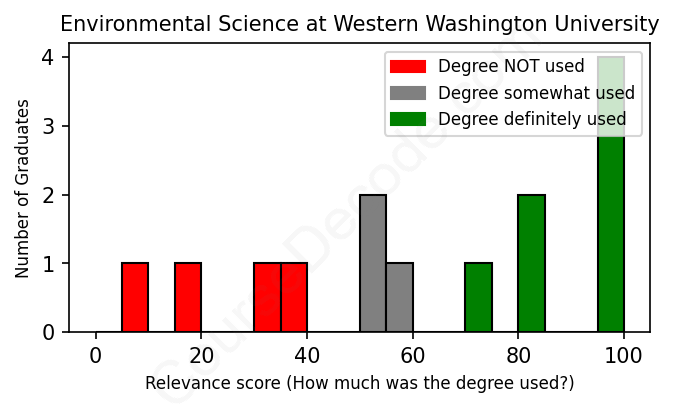
First, some facts. Of the Environmental Science graduates from Western Washington University we've analyzed , here's how many have used (or NOT used) their degree in their career:

These are estimates based on AI analysis of 14 LinkedIn profiles (see below).
The verdict? Slightly below average. Overall, with an average relevance score of 63%, Environmental Science graduates from Western Washington University have a slightly lower likelihood (-4%) of finding work in this field compared to the average graduate across all fields:
And for comparison, here's the chart for all profiles we've looked at across all degrees.
Also, after graduating, 50% of these graduates have pursued further education other than another Bachelor's degree (such as a Masters degree or other), compared to the average across all profiles of 35%. This suggests you may need more than just a Bachelors degree to be competitive as a Environmental Science graduate.
See the details:
|
Relevance score: 33% We think this person has NOT gone into a career related to their degree. We think this person has NOT gone into a career related to their degree.
DEGREE INFOGraduated in 2010 from Western Washington University with a Bachelor of Science (B.S.) in Environmental Science. Also pursued further education since (see below). JOB HISTORY SINCE GRADUATIONAdministrative Assistant Folkman Eye Clinic Jan 2011 - Sep 2012 AASI/PSIA Certified Snowsports Instructor  Vail Resorts Nov 2012 - Apr 2014 Secondary Math Teacher  Albuquerque Public Schools Aug 2014 - Aug 2016 Archives and Special Collections Graduate Employee  University of Northern Colorado Sep 2016 - May 2018 Student Organizations Specialist  University of Northern Colorado Sep 2017 - Dec 2018 Student Activities Specialist  The University of New Mexico Mar 2019 - Jul 2021 Catalog & Curriculum Specialist  The University of New Mexico Jul 2021 - Sep 2023 Project Manager  Coursedog Oct 2023 - Present FURTHER DEGREES DONE SINCE GRADUATINGMaster of Arts - MAUniversity of Northern Colorado 2016 - 2018 ABOUTExperienced Higher Education professional with deep knowledge of SIS data and experience with custom integrations. Excellent at process improvement. Adept at translating user needs to technical requirements. Adaptable mindset, able to balance multiple priorities and projects in response to changing business needs. |
The top 10 most common jobs done by the graduates we've analyzed (ranked most common to least) are:
When diving into the career paths of graduates from Western Washington University who studied Environmental Science, it’s clear that there are a few standout roles in the environmental field. Many alumni have taken positions such as Biological Technicians, Habitat Restoration Technicians, and Wildlife Biologists, which closely align with their education and directly apply the skills learned during their studies. Jobs related to research and fieldwork with organizations like the Department of Fish and Wildlife and various conservation groups showcase the relevance of their academic background. These roles are heavily science-oriented and focus on real-world environmental issues, indicating a strong link between their degree and their job responsibilities.
However, not all positions held by these graduates are entirely relevant to Environmental Science. A noticeable portion of these LinkedIn users have gravitated towards roles that only tangentially connect to their studies, such as administrative positions, teaching roles, and even sales jobs. For instance, working as a QA Technician or in customer service roles like a Grocery Clerk doesn't leverage their environmental science knowledge in any substantial way. Overall, while there is a significant number of graduates employed in roles that are pertinent to Environmental Science, including field technicians and researchers, many have found themselves in jobs where their degree doesn't play a crucial role, highlighting a mixed bag when it comes to job relevance in their chosen field.
Here is a visual representation of the most common words in job titles for Environmental Science graduates (this is across all Environmental Science graduates we've analyzed, not just those who went to Western Washington University):

Graduates from the Environmental Science program at Western Washington University seem to have a pretty diverse range of career paths after they finish school. For a good number of them, it looks like the first job tends to be related to hands-on science roles, like research assistant positions or field technician jobs. Some even start off in internships that offer experience in ecological or wildlife conservation, which aligns well with their studies. For instance, a few grads worked as technicians or interns with organizations focused on habitat restoration or fisheries management right after graduation.
Fast forward five to ten years down the line, and you'll see a mix. A decent amount of these graduates have moved into more advanced roles within environmental organizations, such as becoming directors or managers, particularly in nonprofit sectors focused on conservation. However, it’s clear that not everyone has landed squarely in the environmental field long-term. Some have taken some detours into areas like education, teaching, or even unrelated fields altogether, like management roles in different industries. Overall, while many have pursued and maintained a path that’s relevant to Environmental Science, there are also quite a few who have ventured off into other career territories. It's a bit hit or miss, but there are definitely successful stories among them in terms of meaningful environmental work!
Honestly, a Bachelor’s degree in Environmental Science, whether at Western Washington University or somewhere else, can be a mixed bag when it comes to difficulty. It’s not a cakewalk, but it’s not the most brutal major either. You’ll be digging into both the science part—think biology, chemistry, and even some physics—along with policy and sustainability topics, which keeps things interesting. It requires solid study habits and a genuine interest in the environment, but if you’re passionate about it, you’ll likely find it engaging and rewarding. So, while you’ll definitely have to put in the effort, a lot of students find it manageable, especially if they connect with the material.
Most commonly, in the LinkedIn profiles we've looked at, it takes people 4 years to finish a Bachelor degree in Environmental Science.
Looking at the job paths of these Environmental Science grads from Western Washington University, it's kind of a mixed bag when it comes to making decent money. Some of them have landed solid roles, like the guy who's now the Director of Operations at Stand.earth, which probably pays well given the level of responsibility. Others have started off a bit lower on the pay scale, doing internships or seasonal jobs that don't typically bring in the big bucks, like the wildlife and fishery technician roles. The ones who climbed the ladder in nonprofit organizations or moved into managerial positions likely see better salaries, while those still in technician or entry-level roles might struggle a bit more financially. So overall, it seems like some are doing alright, while others might still be trying to work their way up.
Here is a visual representation of the most common words seen in the "about" section of LinkedIn profiles who have a Bachelor degree in Environmental Science (this is across all Environmental Science graduates we've analyzed, not just those who went to Western Washington University). This may or may not be useful:

Here are all colleges offering a Bachelor degree in Environmental Science (ordered by the average relevance score of their Environmental Science graduates, best to worst) where we have analyzed at least 10 of their graduates:
| College | Score | Count |
|---|---|---|
 University of North Carolina at Chapel Hill University of North Carolina at Chapel Hill
|
87 | 10 |
 The Ohio State University The Ohio State University
|
85 | 12 |
 University of Vermont University of Vermont
|
68 | 13 |
 University of Oregon University of Oregon
|
66 | 10 |
 Western Washington University Western Washington University
|
63 | 14 |
 University of Virginia University of Virginia
|
57 | 15 |
 Oregon State University Oregon State University
|
56 | 11 |
 Loyola University Chicago Loyola University Chicago
|
56 | 11 |
 Southern New Hampshire University Southern New Hampshire University
|
53 | 15 |
 University of Phoenix University of Phoenix
|
46 | 15 |
 Florida State University Florida State University
|
45 | 16 |